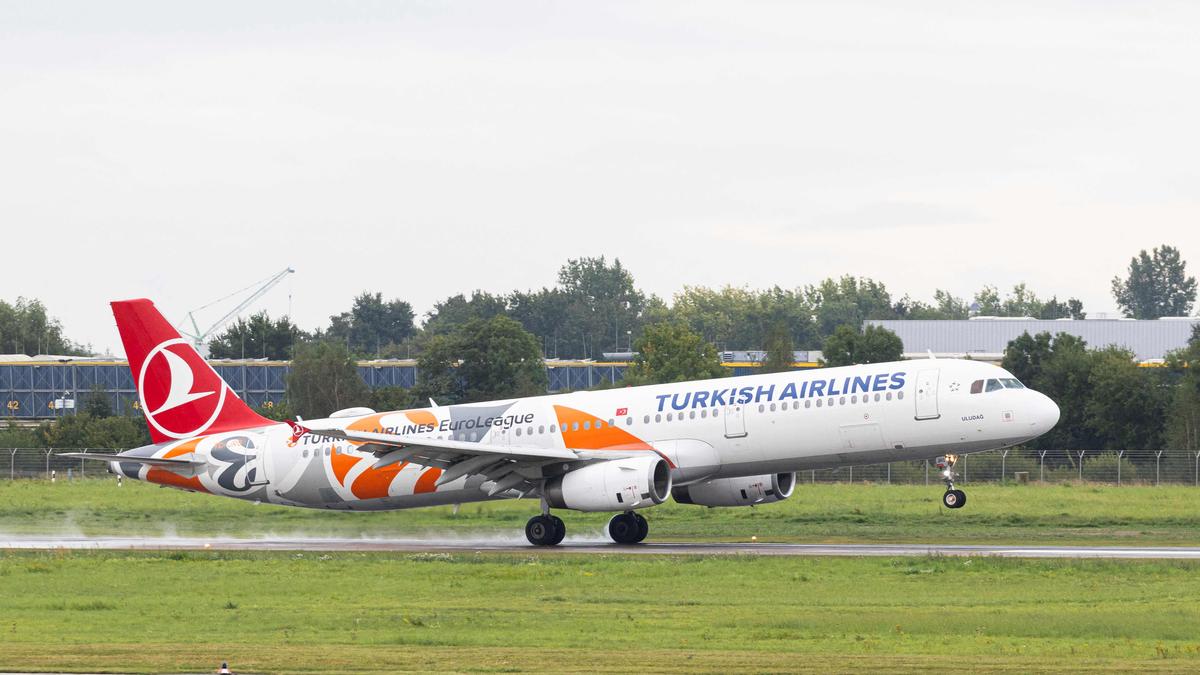
An airplane of Turkish Airlines.
| Photo Credit: AFP
The story so far: IndiGo received a third extension from the Directorate General of Civil Aviation (DGCA) to lease two Boeing 777-300ER aircraft and crew from Turkish Airlines, after previously facing a directive to end the partnership amid heightened anti-Turkey sentiment related to its support for Pakistan during border tensions with India. The move comes as a sizeable number of IndiGo’s aircraft remain grounded even as the global industry faces a shortage of planes.
What does the latest DGCA order say?
The DGCA has given IndiGo a third extension to lease aircraft and crew (also known as damp leasing) from Turkish Airlines, reversing its earlier ultimatum to end the partnership. The original request was for a period of three months from December 1, 2024 to February 28, 2025. In May, the DGCA said it was granting a “one-time, final extension” for three months upto August 31, 2025 to avoid passenger inconvenience due to flight disruptions when IndiGo’s damp lease permission was due for a review. The DGCA’s rules allow airlines to wet or damp lease foreign registered aircraft for a period of 12 months that is extendable once by further six months.
IndiGo started using the B777 aircraft to provide connectivity from Delhi and Mumbai to Istanbul in February and May of 2023. “This extension comes at a crucial time and will help mitigate losses to Indian aviation due to geopolitical restrictions, and greatly benefit Indian travellers during the peak travel season by ensuring a seamless, direct connection to Istanbul and points beyond,” IndiGo said in a statement.
Why are such leases important for IndiGo?
The damp leasing of B777 from Turkish Airlines is not the only tie up where IndiGo has loaned aircraft along with its crew from foreign entities. As on June 30, 2025, of the total 416 aircraft in its fleet, IndiGo has six Boeing 737s from Qatar Airways, two A320ceos from Latvian entity Smartlynx and one B787 from Norwegian carrier Norse Atlantic. The DGCA has also approved SpiceJet’s plan to wet lease five Boeing 737 aircraft from Turkish carrier, Corendon Airlines.
Wet and dry (aircraft sans crew) leases are increasingly being adopted by airlines in order to overcome the shortage of new aircraft globally that has grown acute since the pandemic because of supply chain challenges. Airlines worldwide, including IndiGo, are also being forced to retain and sometimes revamp old and less fuel-efficient aircraft to overcome the shortage. According to the International Air Transport Association (IATA), aircraft deliveries are currently running 30% below their previous peak levels, leading to a record-high backlog of 17,000 aircraft. Based on IATA’s analysis, if this backlog increase is attributed solely to delivery delays, airlines are effectively short by 5,400 aircraft, representing approximately 18% of the active global fleet. With annual production anticipated to remain around 2,000 aircraft per year, IATA projects that it could take between three and five years for the industry to resolve this shortfall.
In IndiGo’s case, which is the country’s largest airline by fleet as well as by market share of 65%, the shortage is made more severe by the grounding of 60-70 aircraft due to Pratt and Whitney related engine issues.
How has the industry responded?
“From a business standpoint, restricting cooperation with Turkish Airlines would be counterproductive. Indian airlines benefit from code-shares and partnerships that expand their global reach, and passengers gain from greater connectivity and competitive fares. Aviation should remain a driver of growth and opportunity, while political differences should be managed through diplomacy, not by limiting the commercial potential of our airlines and travellers. If India wants its carriers to compete globally, it must enable access, not restrict it,” says Alok Anand, founder of aviation assets management company Acumen Aviation.
Published – September 03, 2025 08:30 am IST























